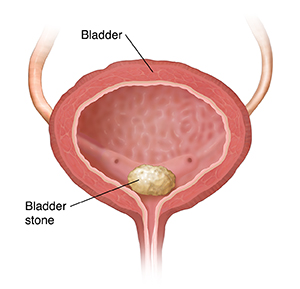
Bladder Stone
Hard masses of minerals in the bladder are known as bladder stones. The minerals usually present in urine get solidified and form stones. This often happens when you have incomplete emptying of your bladder.
Small bladder stones may pass on their own, while larger bladder stones can require medicine or surgery. Bladder stones can cause infection, Blood in Urine and other problems if they are not treated.
Symptoms of Bladder stones may include:
- Pressure and/or pain in the abdomen
- Blood in the urine, unusually coloured or dark pee,
- Difficulty urinating,
- Frequent urges to urinate,
- Inability to urinate except in specific positions,
- Interruption of the urine stream,
- Soreness or discomfort in the penis, and
- Signs of UTI (such as fever, pain when urinating, and need to urinate often)
To identify bladder stones the following tests may be done:
- Bladder or Pelvis X-Ray
- Abdominal ultrasound or CT scan
- Cystoscopy.
If you have little bladder stones, you may be able to force them to pass on their own by drinking a lot of water. However, if you are unable to urinate, this could not be effective.
Your doctor might advise the following if they don't pass naturally:
- Breaking the stones into pieces: This process is known as Laser cystolithotripsy. To locate the stones, your doctor does a cystoscopy first. Then, they break up the stones with Holmium Laser and flush out the small fragments through the cystoscope.
- Surgery: You could require surgery to open your bladder and remove the stones if they are too big to break.
Make an appointment right away with India's number one Urologist Dr Atul Jain for consultation on your urological issue.
Call With Doctor